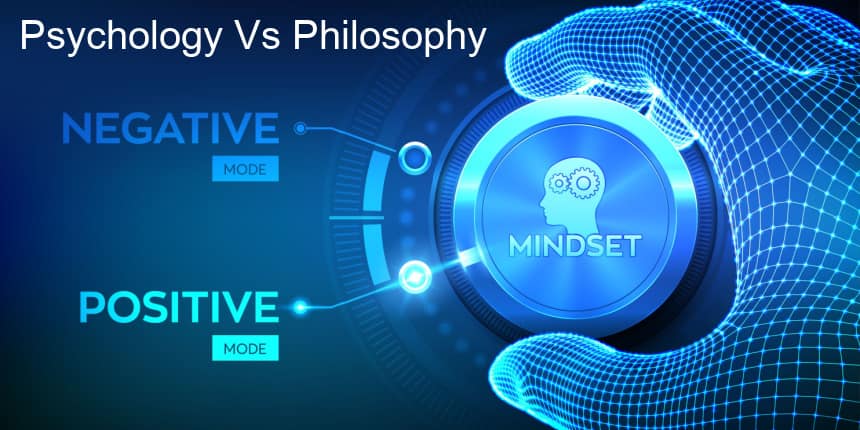Psychology vs Philosophy: Difference Between Psychology and Philosophy
Both psychology and philosophy have their roots in the study of people, however, one focuses on what the human condition is (philosophy) while the other seeks to understand why it is what it is and how it functions precisely in certain contexts (psychology).

But from a historical perspective, philosophy is centuries older than psychology, having been around long before psychology was given legal recognition.
It is important to state upfront that, despite the similarities between the two fields, one dominates in terms of conception time and overall concern. Because of this, all psychology can be regarded as a branch of philosophy, at least to the extent as all psychological theories have philosophical roots or forebears.
Let's examine some of the distinctions after that. The explanations will be succinct due to the wide expanse of these topics and the inability to adequately cover them without giving several hours' worth of lectures. However, they will undoubtedly express the essence of both disciplines!
Differences Between Psychology and Philosophy
Philosophy Studies all of the Wisdom, While Psychology Studies “The Soul”
Psychology's primary focus is much narrower than philosophy's. Philosophy explores deeper concerns regarding the nature of existence, such as what purpose there is in having a life if one can be said to exist. Psychology only examines how humans work, what their motives are, what determines their likes and dislikes, etc. What kind of thing is knowledge? How can we be sure our sensations are genuine and not just illusions?
These are a few of the main philosophical issues. However, psychology examines the human mind, specifically perception, memory, and interpersonal relations. Thus, the questions that psychology must address are far more constrained. This does not necessarily imply that philosophy or psychology is superior to the other. Simply put, it indicates that they are distinct fields with unique concerns.
2. Philosophy Tends to be More on the Observational, Notional Spectrum, While Psychology is Usually Observable
Epistemology (the study of knowledge), phenomenology (the study of experience), axiology (the study of ethics and aesthetics), metaphysics (the study of the nature of reality), and logic are some of the branches that make up philosophy. Since there were no experimental labs available in Ancient Greece when philosophy originally emerged, the majority of these branches don't involve any physical experimentation.
Philosophical labs as an idea still don't entirely exist. What does exist, however, are the countless books that philosophy students use for research and to come up with thoughtful responses to their queries. The majority of psychology, on the other hand, is based on observable occurrences. Since not all schools of psychology are eminently observable, there are several exceptions to this rule (psychoanalysis being a huge example).
Also Read: Free Philosophy Courses
But this statement—that psychologists do their research through trials and data analysis—remains true for the most part. This is a crucial distinction; while it is possible to conduct just qualitative research in psychology, possibilities are scarce and only available if you can demonstrate that the research has some application in real-world settings.
3. Studying Philosophy Leads to Significantly Different Jobs Than Studying Psychology
Although this difference may be underappreciated, it cannot be disregarded in terms of causality. Both philosophy and psychology are extremely difficult to study. But as we have already seen, some philosophical positions can be adopted within psychology as well. The Cognitive Behavioural school of psychology, for instance, is empiricist in that all of its conclusions are based solely on observable events.
The entire basis of the philosophical pillars of rationality is challenged by psychoanalysis, which does not at all depend on reason. Once more, this is only meant to be used as an example and is not intended to be accepted at face value.
Essentially, the argument is that studying psychology opens up whole new job options than studying philosophy. This is important since a psychologist might work as a researcher, a psychotherapist, or a counselor, training methods and training materials aside.
Also Read: Free Psychology Courses
However, a philosophy graduate is more likely to find employment as an academic writer, writer, researcher, or tertiary educator. This is unquestionably the kind of knowledge that can influence a person's direction in life, and even what they contemplate doing for their bachelor's degree!
Nurture your Curiosity
Knowing the distinctions between psychology and philosophy should help you decide more clearly what you want to study in the future. But one of the best things about learning in the first place maybe even be better than having such a wide variety of literature to pick from when it comes to studying!
There is a good probability that your interests will greatly overlap, so don't stress too much about which one belongs firmly in which category. Just concentrate on earning a degree in the more broad field, and continuing pursuing all of your little interests!
Also Read: Popular providers offering psychology courses
Conclusion
For those who have an interest in studying people and learning everything there is to know about how they function, psychology provides a variety of exciting career opportunities. And you should unquestionably seek a career in the field if you're interested in it.
If you're concerned that you don't yet have these skills, rest assured that you will acquire them while you study psychology, so there won't be any issues at all! On a long voyage, you should take the first few steps; the rest will take care of itself.
